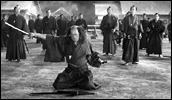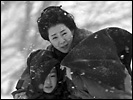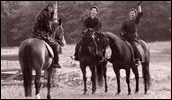Year One in the North
- Year
- 2005
- Original title
- Kita no Zero-nen
- Japanese title
- 北の零年
- Director
- Cast
- Running time
- 168 minutes
- Published
- 24 October 2005



by Tom Mes
The last few years have given little cause to hope for a revival of the chanbara genre to the level of its illustrious past. In this corporate world in which cinema has become, as the execs in the Japanese film industry term it, "entertainment content" - i.e. generic fodder whose sole function is to plug up the hole in your DVD / BluRay / whatever-they-come-up-with-next player - who is going to stick his neck out to deliver a furious, bile-spitting attack on corrupt political structures? Even when the structure that supports that same corporate world once more makes the analogy with the repressive social model of the Tokugawa period a valid one. One thing is for sure, it's not going to be Isao Yukisada.
Yukisada's Year One in the North is set in the tumultuous last days of the Tokugawa shogunate and follows the exploits of a vanquished, shogunate-loyalist clan exiled to the savage northern lands of Hokkaido. Sent by ship to virtually uninhabited woodlands, the formerly proud men and women have to get their hands dirty in order to build a new community for themselves from scratch. Under the temporary leadership of Komatsubara (Watanabe), they endure the harsh winter as they ready the town for the arrival of their lord in spring. Their master, however, brings only the news that the social reforms of the Meiji restoration has disbanded all clans and that they are left to their own devices, before turning his procession around to head back to Honshu. As the months pass, crops fail and hardships increase, progress catches up even with those in the high north, in the shape of a succession of bureaucrats and magistrates that threaten to take away their land and turn the once mighty samurai into ordinary, subordinate citizens.
With the same historical setting and the same lead actor in Ken Watanabe, Year One in the North is quite clearly meant as a homegrown attempt to outdo (or cash in on) the Tom Cruise vehicle The Last Samurai. The result is certainly spectacular and sprawling enough, with the added bonus of a larger historical awareness. Yukisada's film is less naïvely feudalistic, though still firmly nostalgic about the good old days. Progress is once again depicted as a corrupting and humiliating force for once honourable warriors, who find themselves emasculated by moustachioed little men in ill-fitting frock coats and bowler hats.
After the box office hits of Go and the 'pure love' weepy Crying Out Love, in the Center of the World (Sekai no Chushin de, Ai o Sakebu, 2004), director Isao Yukisada seems to be in a position to choose any project he wants. The scope of Year One in the North is a testimony to the trust he currently enjoys from the industry bigwigs, but the film sees him unimaginatively tracing the contours of what he thinks an epic should look like. When compared to Kenji Misumi's superbly measured and understated but also deeply personal 1974 swansong The Last Samurai (Okami yo Rakujitsu o Kire, a film crying out for a DVD release), which also chronicles the downfall of the shogunate and the dilemmas of individual samurai in the post-feudal world in nearly three hours, the lack of personality and viewpoint of Yukisada's film becomes immediately clear. Here, we are firmly in post-Twilight Samurai territory, where samurai are brave men who don't mind literally getting their hands dirty and where giri and ninjo have been modified into pompous heroism and melodramatic romance, no longer at odds but conveniently combined and packaged to appeal to both the male and female TV crowds used to this type of two-dimensional drama.
Yukisada's shoulders may be strong enough to carry a big-budget load, but after the flat Rock 'n' Roll Mishin (2002) and the vacant A Day on the Planet (Kyo no Dekigoto, 2003), Year One in the North shows once more that his talents aren't quite sufficient to fulfil the promise of Go. As an understudy to Yoji Yamada - a position he seems all to eager to fill - he should be good for several decades of diligently crafted seat fillers for the major studios, though.